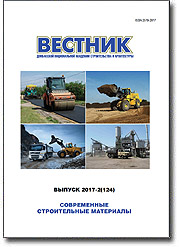Analysis of Quality of Fibrous Concrete by Method of Mathematical Planning of Experiment
Abstract: With orthogonal central composite plan of full factorial experiment it has been analyzed the effect of fiber-reinforced concrete structure on its physical and mechanical properties. Fiber has been obtained from the grinding of waste heat resistant steel. The mathematical model of the process is a function of linking optimization parameters: density, compressive strength, tensile bending with the composition of fiber-reinforced concrete. It has been found out an increase in water content of the cement mixing reduces the density and strength properties; increase in the content of sand in the cement provides a growth density and strength properties. Increasing concentration to 4,5 % fiber results in an improved quality of fiber-reinforced concrete. To increase the strength properties of the concrete it has been recommended the fibers content in the cement in the range of 2,0…4,5 %, which ensures the stability of the strength and density.
Keywords: fibrous concrete, the compressive strength, tensile strength in bending, a density ratio of water and cement, and sand and cement.
Pages: 138-142.
For citation: Ryabicheva, L. A.; Zacko, V. V.; Poida, L. N. Analysis of Quality of Fibrous Concrete by Method of Mathematical Planning of Experiment. – Text : electronic. – In: Proceeding of the Donbas National Academy of Civil Engineering and Architecture. – 2017. – Issue 2017-2(124) Modern building materials. – Р. 138-142. – URL: https://donnasa.ru/publish_house/journals/vestnik/2017/2017-2(124)/st_24_ryabicheva_zacko_poyda.pdf (date of access: 19.11.2024). – ISSN 2519-2817.

Issue 2017-2 (124)
Journal: Proceeding of the Donbas National Academy of Civil Engineering and Architecture
Publish house: Donbas National Academy of Civil Engineering and Architecture
Journal: Proceeding of the Donbas National Academy of Civil Engineering and Architecture
Publish house: Donbas National Academy of Civil Engineering and Architecture
